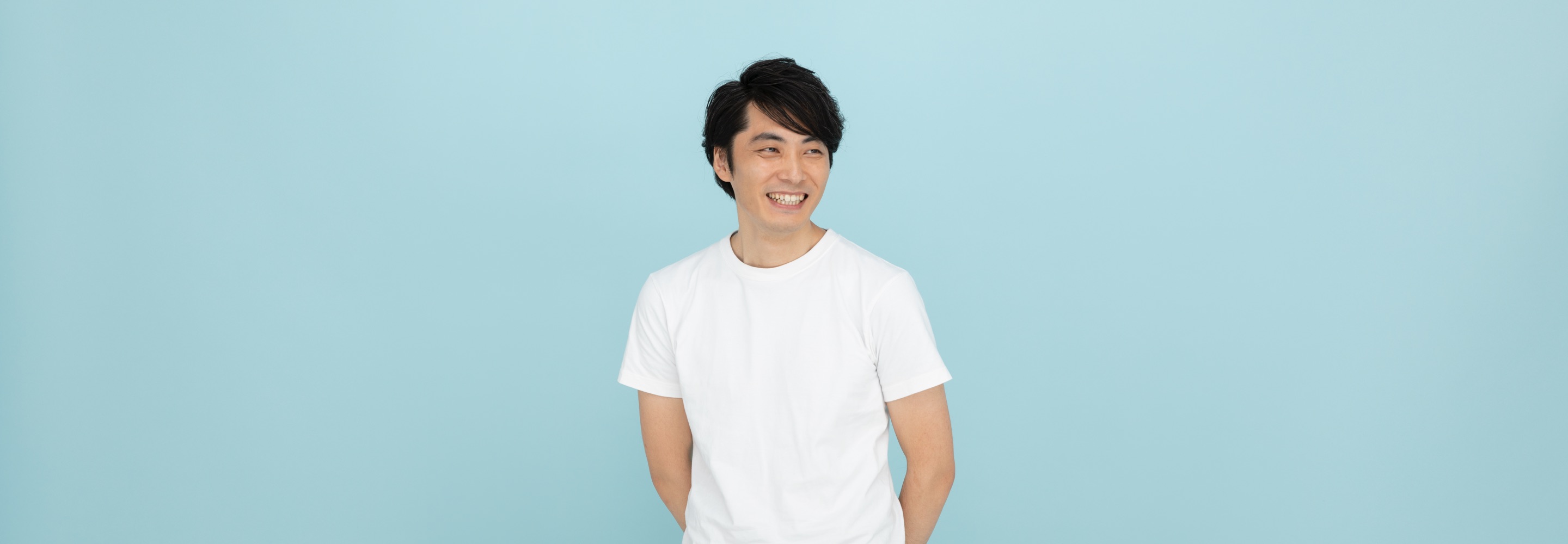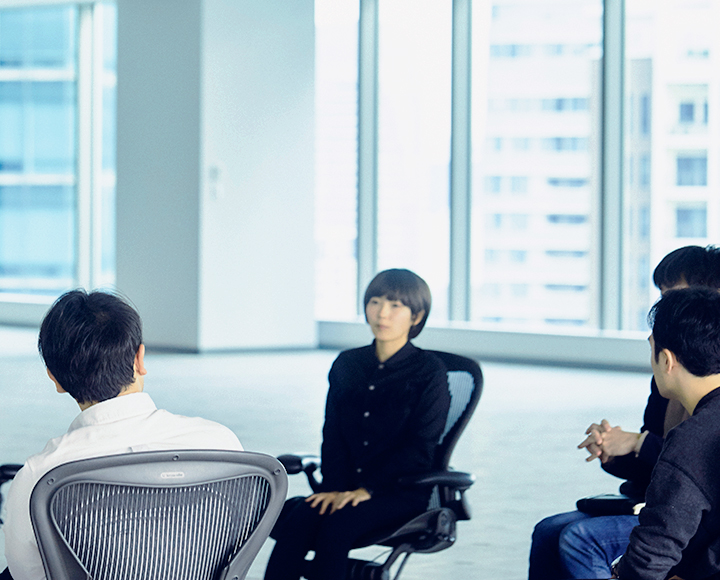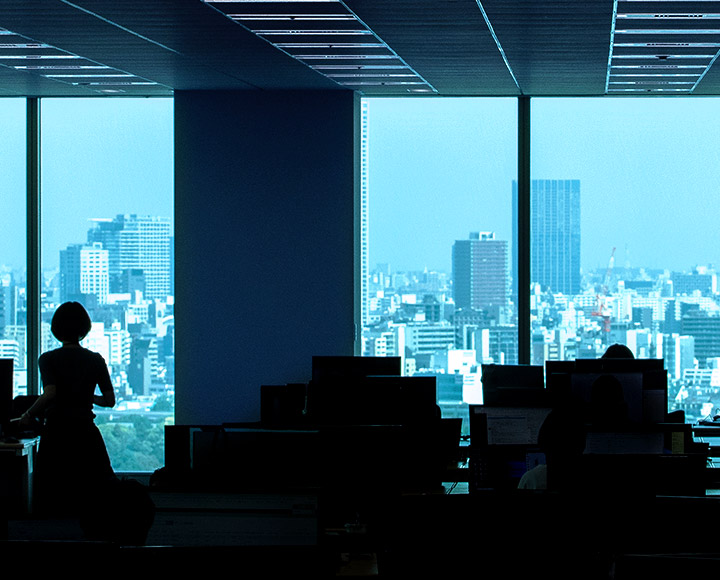
Our job is to solve medical problems. To do that, we have to think
about what needs to be done and to tackle designs head on.
Creator's story - Keisuke Koyama
JobMedley is one of Japan's largest medical care job posting
sites. A certain designer has supported Medley's mainstay services
since its founding. His name is Keisuke Koyama.
Koyama joined Medley after he had built up his experience as a UI
designer at a production company. He is acclaimed for his
experience in leading significant changes in mindset—ranging from
designs that respond to customer needs to designs that maximize
our business growth.
Transitioning from the pursuit of creative quality to a commitment to business
Koyama specialized in spatial design while at university. He
started his career as a spatial designer who produced planned
exhibitions for the museum. Since he was in charge of the design
of the company's website, he concentrated on website design and
transferred to a design company.
"It was an environment where there were high expectations from
designers. In particular, my supervisor, who was the creative
director, was excellent, and it was hard to keep up with them
regardless of how hard I tried. I expected to change jobs in about
3 years; however, I thought that I could learn things that I had
yet to learn while there, and before I knew it, I had been working
there for 7 years."
Even though he considers himself still lacking in the technology
department, he continues to accumulate experience. Although
clients and projects differed, to some extent, he became able to
deal with projects on the basis of previous experience.
"I think it was about 5 years ago. I increasingly felt as if I was
repeatedly doing the same work. Combining that tone and matter
with this composition and with your own knowledge, you could
basically see the path. Although the change meant that progress
with work was easier, I began to become worried about whether
continuing this way was the right thing for me."
He still thinks he is lacking technically. Despite this, there was
a feeling of having become used to things. To get rid of that
impatience and anxiety, Koyama started a second job, helping with
a start-up.
"I think that the more extensive the design and the newer the
environment, the better the designer's perspective becomes. I
started working on several services, including real estate
matching sites and medical imaging services. Of course, it was not
only about UI. I was responsible for various tasks, from service
design to branding, UI, and coding, as needed for the project."
"I was able to keenly feel the possibilities with design through
my second job. On the other hand, I learned the hard lesson that
it would be difficult for designs that pursued just beautiful
styling up to now to contribute to the business and demonstrate
great value. I wanted to go to an environment that is deeply
related to the business rather than just ending with the creation
of a product. This is how I began to feel."
Becoming keenly aware of medical information issues and considering design solutions
Koyama first thought of medical care when considering a job
change. At the design company, he continued to be in charge of
designing medical apps and QA services and felt that it was highly
challenging and rewarding. There were also some changes to his
environment.
"The birth of my child was a particularly important trigger. My
child was born in a dangerous physical state. I went through the
difficulty of wanting accurate information yet having trouble
getting the information that I needed."
At the time of discharge from the hospital, each of the midwives
and doctors had a different answer about what caring for a child
was like. In some cases, depending on the person, they would say
the exact opposite. None of the apps that he looked to in an
effort to allay some of his fears were helpful.
"When you are looking for information about childcare or medical
care, if there is incorrect information or information that makes
you unsure, you become extra anxious. I was shocked about having
to go through that. It was a moment when you suddenly realize the
existence of an issue that you had not been aware of previously. I
thought that we should not increase the number of people who feel
anxiety just like I did." He had strong feelings about the issues
with medical information and talked about his experience even
during his interview. He strongly believed that "if it can be
solved with design, then it must be done." However, he also
worried about whether "his thoughts would be accurately
understood."
"I had never tried to convey my ideas to anyone around me, and I
was worried that I was the only one moving blindly. However,
Medley had a big plan moving forward to change medical care in a
way that was far beyond my ideas, and not only executives,
designers, and engineers but all sorts of people in different
functions were working seriously to resolve medical problems from
their respective perspectives. I was very surprised when I heard
the story,"
He also felt the palpable level of seriousness being shown when he
heard that physicians were working in the company.
He had been in an environment where physicians had been used as
external advisors, and there were not many companies who
intentionally employed physicians. In this environment, Koyama was
determined to buckle down and take on challenges.
In business, those related to design take full responsibility
Upon joining the company, Koyama was appointed to work on
JobMedley, a medical and nursing care recruitment website.
"I checked every item with "design" in its name, including
"banner, information design, as well as the UI," on a day-to-day
basis." As the scale of business expands and the scope of
responsibility expands on a day-to-day basis, the sense of balance
between business and creative quality is important.
"There is only so much that one person can do. It would be
difficult to be involved in everything 100%. That is why it is
important to prioritize and streamline. For example, to enable
even just engineers to create a UI, we prepared universal design
parts, and to respond quickly to sales needs, we created a banner
template, as well as creating an environment that allows not just
designers to create designs. We are constantly conscious of
achieving outcomes without compromising quality."
Medley moved offices in September 2018, and Koyama was also
involved in the design of the new office. Koyama's first role was
as a spatial designer. Utilizing this experience, he was also
responsible for the concepts and designs for his new office. He
focused on an office that expressed Medley's qualities. For more
information, please read
the blog.
Importance of a mid- to long-term design perspective
Koyama states that "The environment has changed, and the way of
tackling design has changed significantly." It is different from
when he pursued quality at the design company. Now there is a need
to pursue creativity for business growth.
"You could go even far as to say that in the past, if you could
create something good then that was enough. Back then, it was
about how much attention should have been devoted to finding
design solutions and raising their quality, but now we have to
think about focusing creativity on business growth each time.
After doing it for so many years, I had a habit of pursuing
overwhelmingly good creativity, and I found it difficult to let go
of this habit in order for me to let things go after expending an
adequate amount of time and effort."
In designing services in the mid-and long-term, it is not about
pursuing preferences for details but to design on the basis of the
nature of the services. This attitude was very different from the
mindset that he was used to when he was at the production
company.
"In our business, we must design from a medium- to long-term
perspective. If we focus on putting together each and every step,
we would not be able to design from a broad perspective. My job is
to solve the issues with medical care. We must think about what we
should do today and tackle the design."
This change in perspective also greatly affected how he spent his
off hours. Up until then, he had not gone out for a drink much
after work; however, Medley began to deepen the relationships
between the members of departments by encouraging them to go out
every once in a while for a drink.
"At my previous company, I did not feel that I was growing
regardless of how hard I worked, and I was very anxious. I put
pressure on myself to keep up with the top and did not have enough
time to take a breath. The excessive pressure that I put on myself
disappeared, in a good way, when I came to Medley, and the way I
study has also changed. I was able to talk about the design and
business while drinking, and I gained a great deal of information.
I realized how I had been stuck in a rut up to that point."
The idea of creating the future of medical care through design
The scope of responsibility of each employee in the field of
business is wide. There is some distress; however, there is also
responsibility and discretion. Koyama believes that it is only by
the grace of other members that he is enjoying the present
situation.
"In terms of resolving issues, I think all my colleagues appear to
be designers. Among them, I think I play the role of the person
who can draw pictures well, so it is clear where I can demonstrate
my value."
The scope of one's value is not limited to the so-called "design."
By using one's skills, an individual can commit to various parts
and be in an environment where that is what is required. In large
enterprises, people are given jobs according to the tasks.
However, in a start-up, the norm is to do everything that you can
do. Koyama believes that Medley's designers need the spirit of
tackling business on that basis.
"You can go as far as to say that we think we need to be able to
discard career experiences to date. It is good to use your career
experience; however, if you become too career-oriented, it will
narrow the scope of activities that can be performed. Even if you
are a UI designer like me, the range of tasks required at Medley
is very wide. We want to continue to engage in business by trying
to create the future of medical care through design rather than by
building up a career as a designer."
-
Date: OCT 2018
Return to index



